Black-and-White Warblers breed just to the north and are commonly present by August. They creep along the trunks and major branches, mouse-like. The fall male Black-and-White Warbler has a dark face patch:

In spring the male is more densely streaked and may have an entirely black chest (April 14, 2019):
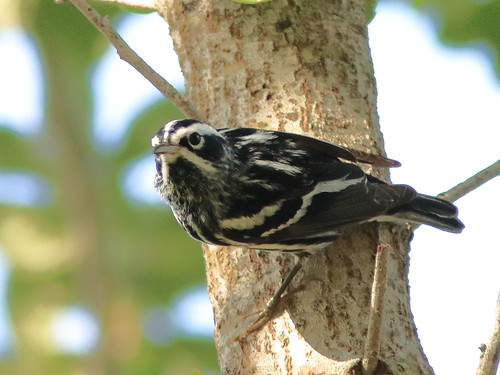
Females and first year males have pale faces:

They are very acrobatic as they seek insect prey hidden in the bark:
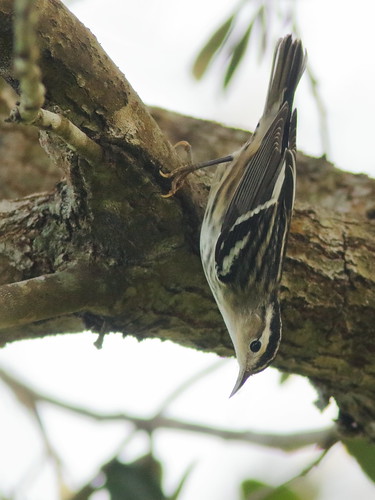
Winter adult male (January 29, 2019):

The Northern Parula is another early-arriving warbler. The dense foliage sometimes makes them difficult to locate. I nearly discarded this photo because I assumed that the bird was hiding out of sight...

...but look closely:

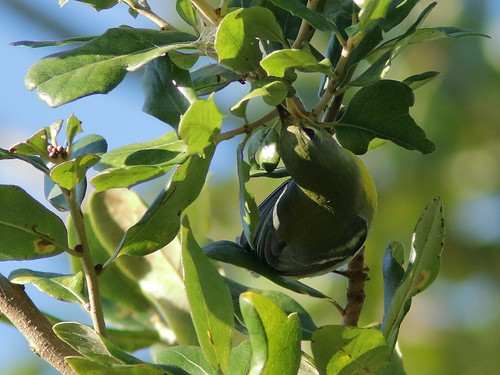
This male Northern Parula just caught a spider:
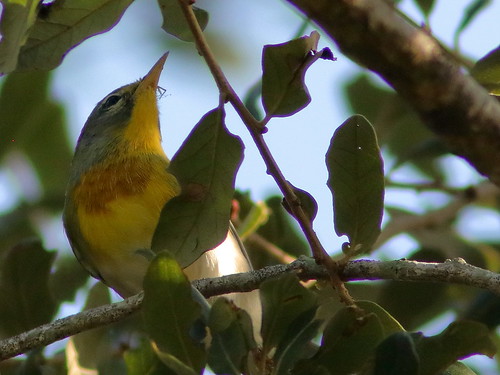
Prairie Warblers are most numerous, as they breed in Florida's coastal mangroves during May through early July and return to the interior for the rest of the year.
This male was very photogenic as it posed on a Pond Cypress in perfect early morning light:
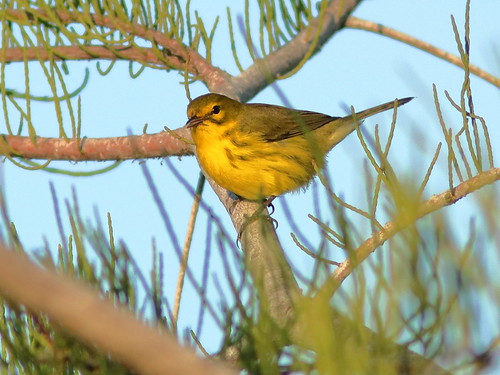
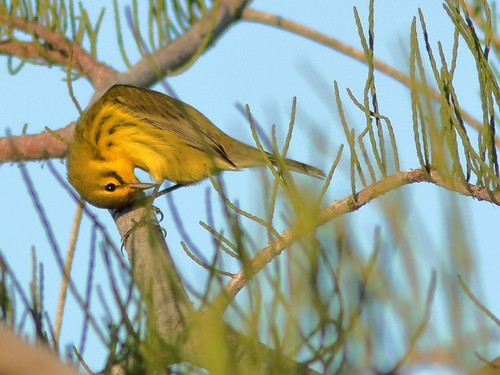
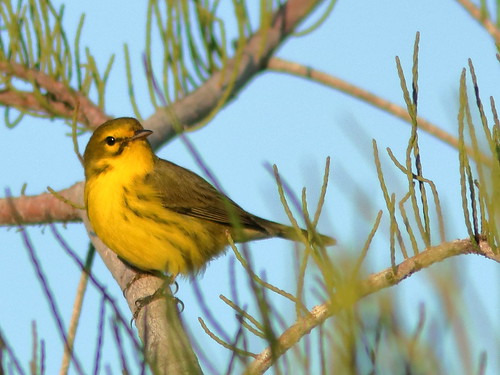
Blue-gray Gnatcatchers often join the warblers. They also breed down into south Florida, although we do not see them here during mid-summer:

Brown Thrashers nest locally and stay year round, but migrants from the north swell their numbers in fall and winter:

The Northern Cardinal is resident all year round. No matter where they breed, they do not migrate and usually remain in close proximity to their nest. This male has not yet finished his post-breeding molt:

In a grassy area along the path, a White-tailed Doe grazed as her yearling fawn eyed me suspiciously:


A young spike buck walked out into the clearing, but moments later the trio bounded away:

Before sunrise on September 9, the dark shadow of a thunderhead out on the ocean interrupted the rays of the morning sun as they converged on the opposite (western) horizon:
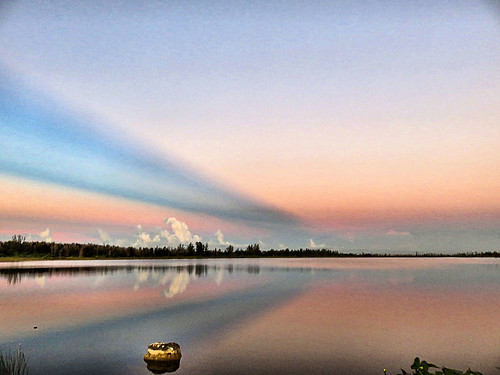
Five minutes before sunrise, the clouds were partially shaded by the horizon and glowed warmly:
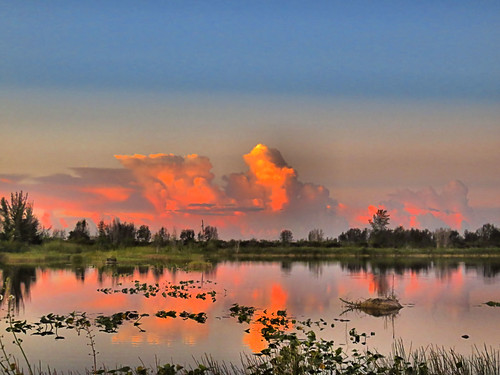
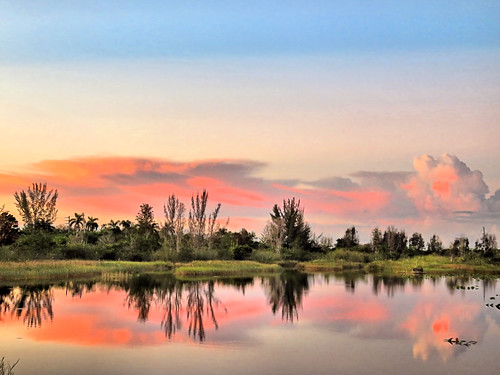
About 35 minutes before sunrise on September 15 the Harvest Moon shone brightly over the lake:

20 minutes later, the clear sky had brightened up:
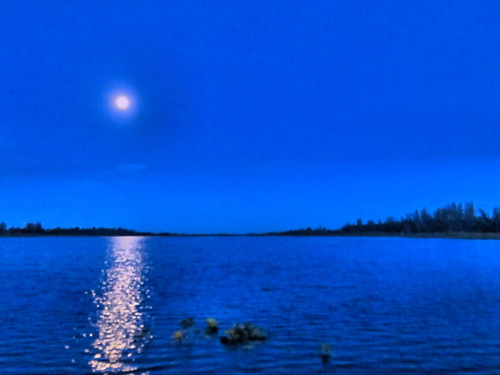
At sunrise on September 9, my shadow pointed towards the Everglades, beyond the lake. On the day of the equinox, like a sundial, it will have moved a bit more to the right and pinpoint 270 degrees, true west.

At our location in south Florida, on September 23 the sun will rise at 90 degrees (due east) on the horizon and set directly opposite (270 degrees), but the length of day and night will not be equal until September 27.
Factoid: In Singapore, located almost directly on the equator, sunrise and sunset will likewise be at opposite points, but the lengths of day and night will never be equal, this year coming closest near our (Northern Hemisphere) winter solstice on December 25, when the day will still be 12 minutes and 16 seconds longer than night.) Read: Why are days always longer than nights at the Equator?
This week I celebrated my 13th Blogaversary. Way before I started blogging (as the term became known), in the mid 1980s, I wrote columns on health care issues and uploaded them via an acoustic modem to the Fort Worth (Texas) Star Telegram web site, StarText. This pioneering “electronic newspaper” started in 1982 and was freely accessible on a computer.
The Star-Telegram is the nation's oldest continuously operating online newspaper. StarText was an ASCII-based service which was eventually integrated into the paper's current website.
I composed my columns on the world's first "laptop," a Tandy TRS-80 model 100 computer, upgraded to 24 KB RAM and which ran on 4 AA Batteries. In 1989 I spent $999.00 upgrading to a Tandy 1100FD laptop with an impressive 640 KB RAM and a 3.5 inch floppy drive. Adjusted for inflation, it cost $2500 in today's economy.
= = = = = = = = = = = = = = =
Linking to Misty's CAMERA CRITTERS,
Linking to Eileen's SATURDAY'S CRITTERS,
Linking to SKYWATCH FRIDAY by Yogi, Sylvia and Sandy
Linking to WEEKEND REFLECTIONS by James
Linking to BirdD'Pot by Anni
Linking to Our World Tuesday by Lady Fi
Linking to Wild Bird Wednesday by Stewart
Linking to Wordless Wednesday (on Tuesday) by NC Sue
Linking to ALL SEASONS by Jesh
________________________________________________
Please visit the links to all these memes to see some excellent photos on display
________________________________________________
Lovely photos...and descriptions
ReplyDeleteYer showing yer age, young man
Ich staune über die bezaubernde Vogelwelt und die phantastischen Aufnahmen des Sonnenuntergangs.
ReplyDeleteKenneth,
ReplyDeleteYour photos are beautiful. I, especially enjoyed your Skywatch Friday shares. The colors streaked in the sky are gorgeous and make me think of a painting. I also loved your Harvest Moon pix and how the light glistens on the water - just beautiful, my friend. Have a fototastic weekend!
The sunrise and moon photos are spectacular!
ReplyDeleteI love your beautiful reflections and your bird close ups!
ReplyDeleteThe Northern Parula looks like a master of camouflage. Pretty shots of the Harvest Moon. Enjoy your weekend!
ReplyDeleteVery interesting and informative post about the birds in South Florida. We live in South Florida on the beach from end of October through May. We see alot of cardinals, turkey buzzards, and black birds around Hallover Park.. I'll have to look more carefully. Thanks for a great post
ReplyDeleteBeautiful shot of dawn
ReplyDeleteWhat beautiful creatures! Thanks for the information about them, too. Most of your birds are new to me, except maybe the names.
ReplyDeleteMy Corner of the World
Kenneth, all your pictures are amazing...well done
ReplyDeleteHello, Happy blog anniversary! I love all the warblers! The male Northern Parula with spider is gorgeous. The Brown Thrasher is one of my favorites too. The sky and reflections are beautiful. Great shadow shot. Thank you for linking up and sharing your post. Beautiful post and photos. Happy Saturday, enjoy your day. Wishing you a great weekend! PS, thank for leaving a comment on my blog.
ReplyDeleteWhat amazing shots! That Northern Parula! Wow does she camouflage well!
ReplyDeleteAs always, extraordinary images Ken. I also enjoy reading your descriptive posts.
ReplyDeleteThanks so much for stopping by and joining us at I'd Rather B Birdin this week...it's always appreciated.
Golly, talking about being involved with the internet! I like it when people in their sixties and older still are involved in the world in some way. If you are alive, you may as well contribute, eh? Your landscapes always come out so dreamy and perfect! Do you use a certain editing program for it? The stripes of the black and white warblers are so pretty! Didn't know red cardinals are homebodies! Again, a marvelous post, Ken!
ReplyDeleteAbout having less friends where you live now, have you thought on joining a photography club? Have an adventurous week!
I shoot nearly all of my landscape and habitat photos with my trusty pocket camera,a Canon PowerShot SX700 HS with 30x Optical Zoom hand-held. This little beauty has excellent image stability and low-light performance. These I process in Corel PaintShop Pro. My DSLR shots are RAW and I use the "box" Canon Digital Photo Professional 4 for these (this program does not process JPG images). Oh yes, one of my friends keeps trying to persuade me to join up with a "local" camera club but it conflicts with choir practice and I would have to fight the traffic as it is not that close by. Our social "circle" hovers around our church and a few neighbors who speak English. Have very nice Cuban "relatives-in-law" mostly down in the Miami area and do get to see them on festive occasions, so we do not feel isolated and are able to help out friends when needed. Oh, to be sixty again (or 70 or even 80)!
DeleteGreat pictures. We were stood on the Tropic of Capricorn a few days ago - but we missed the equinox by a few days!
ReplyDeleteCheers - Stewart M - Darwin, NT, Australia
This comment has been removed by the author.
ReplyDeleteLovely photos, as always on your site.
ReplyDeleteThanks for joining us this week at https://image-in-ing.blogspot.com/2019/09/sleep-what-they-do-best.html
Really amazing photos!!The sunrise is just incredible!!! WOW!! Have a grand day!
ReplyDeleteSuch pretty birds! I have seen quite a few Cardinals growing their feathers back this year. Great photos!
ReplyDelete